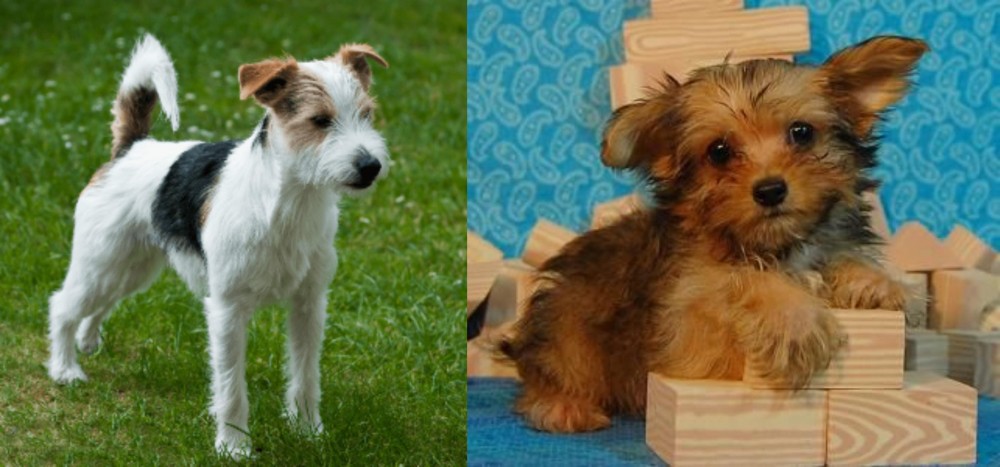 Parson Russell Terrier is originated from United Kingdom but Yorkillon is originated from United States. Parson Russell Terrier may grow 13 cm / 6 inches higher than Yorkillon. Both Parson Russell Terrier and Yorkillon are having almost same weight. Both Parson Russell Terrier and Yorkillon has almost same life span. Both Parson Russell Terrier and Yorkillon has almost same litter size. Both Parson Russell Terrier and Yorkillon requires Moderate Maintenance.
Parson Russell Terrier is originated from United Kingdom but Yorkillon is originated from United States. Parson Russell Terrier may grow 13 cm / 6 inches higher than Yorkillon. Both Parson Russell Terrier and Yorkillon are having almost same weight. Both Parson Russell Terrier and Yorkillon has almost same life span. Both Parson Russell Terrier and Yorkillon has almost same litter size. Both Parson Russell Terrier and Yorkillon requires Moderate Maintenance.
Basic Information
undefined
United Kingdom
United States
Life Span:
12 - 15 Years
12 - 14 Years
Other Names:
Parson, Jack Russell Terrier
Papa-ShirePapa-Shire • Papiyork • Yorkie Pap Papillon-Yorkshire Terrier Mix, Papillon-Yorkie Mix,
Colors Available:
White, black - tri-colored, tan, fawn
White, brown and white, light brown/golden, dark brown/chocolate, black and brown, black
Coat:
Short and smooth, rough or broken
Straight, medium, fine fine, soft coat
Shedding:
Moderate
Moderate
Temperament:
Affectionate, Alert, Cheerful, Courageous, Curious, Energetic, Friendly, Independent, Intelligent, Lively, Loving, Loyal, Outgoing, Playful, Protective, Social, Stubborn, Territorial
Alert, Energetic, Friendly, Loving, Loyal, Playful
Grooming:
Moderate Maintenance
Moderate Maintenance
New Owners Friendly:
Yes
Yes
History
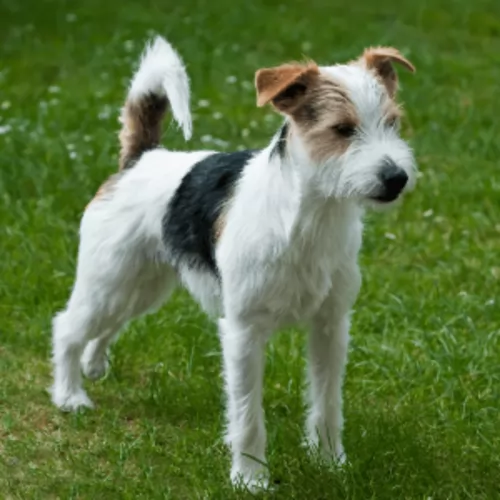 The Parson Russell Terrier hails from England and is a small to medium sized dog dating back to the 18th century. It is believed that Reverend John ‘Jack’ Russell was the developer of this dog. The Parson has always been involved with England’s sport of foxhunting.
The Parson Russell Terrier hails from England and is a small to medium sized dog dating back to the 18th century. It is believed that Reverend John ‘Jack’ Russell was the developer of this dog. The Parson has always been involved with England’s sport of foxhunting.
They’re spritely and quick and have been able to keep up on a hunt and take on a fox in its lair. The dog was first recognized in 1990 in the United Kingdom as the Parson Jack Russell Terrier and in America in 1997.
All the top kennel clubs recognize this dog as the Parson Jack Russell Terrier.
The Yorkillon is a bighearted cross between the Yorkshire Terrier and the Papillon. They are small dogs with huge attitudes and big ears. They are known to be sassy and get into trouble. They are playful, affectionate and intelligent. They were initially developed in the US sometime about 20-30 years ago.
Not recognized by the American Kennel Club as they are considered designer dogs or mixed breeds
Description
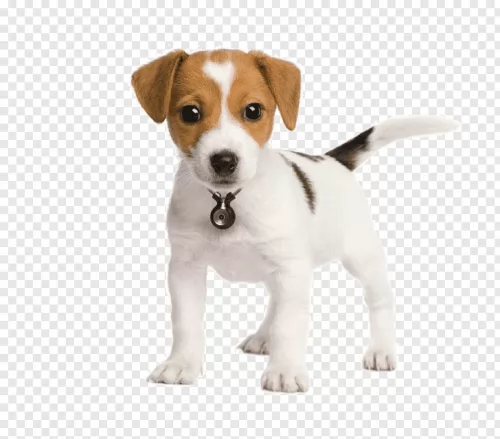 The Parson Jack Russell is essentially a white dog with black and tan or orange-fawn patches. He can be tri-colored too. The coat is either smooth, rough or broken.
The Parson Jack Russell is essentially a white dog with black and tan or orange-fawn patches. He can be tri-colored too. The coat is either smooth, rough or broken.
He stands at between 33–36cm tall at the withers and weighs between 5 and 8kg. Unlike the Jack Russell, the Parson Russell Terrier has longer legs. He has some longer hair on the head, legs and body. The ears are floppy wit the tip pointed forward. The tail has always been docked but when left long it it held high, slightly curving over the back.
Temperament:
Feisty, brave, cheeky and alert, the Parson Russell Terrier is an energetic dog who gets on well with children as he knows that this is essentially where his games come from.
He is bold and clever and you’ll be able to have him trained and socialized without any trouble. These little dogs are full of life and they are protective of their humans and their property, making excellent watchdogs.
The Yorkillon is a small dog that can look like a Yorkie or a Papillon but most due have large ears like the Papillon. Both parent breeds have long hair and short legs. There is still a lot of first generation breeding, but most are now products of multigenerational breeding. This means that every puppy can look different and no two are likely to look the same.
Characteristics
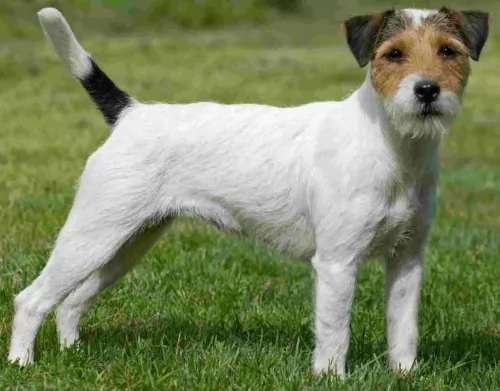 In general the Parson is a friendly,loving dog, fairly small but packed full of feisty personality.
In general the Parson is a friendly,loving dog, fairly small but packed full of feisty personality.
They make excellent pets for the entire family. He is an intelligent dog, but typical of most terriers he can be stubborn, but this can easily be fixed with training and socialization. With good care, he’ll make you a wonderful little pet and companion.
1.Children friendliness yes but be careful the children do not hurt the small dogs. This is particularly true regarding the risk of tracheal collapse.
2.Special talents – loves to do tricks
3.Adaptability – can live anywhere in an apartment as well as a home, but he would prefer to have a fenced yard to run in.
4.Learning ability – extremely smart and very obedient
Health Problems
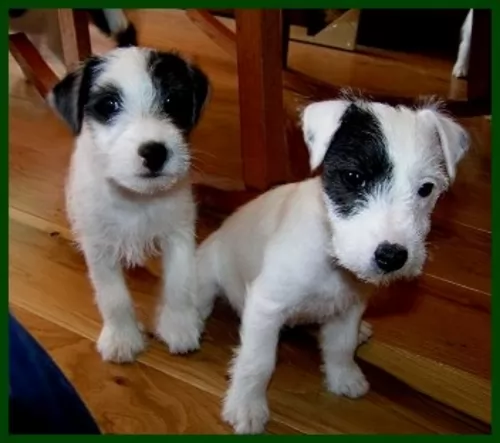 Your Parson Jack Russell can live to be between 12 and 15 years but nonetheless he does have some breed-related health issues to watch for.
Your Parson Jack Russell can live to be between 12 and 15 years but nonetheless he does have some breed-related health issues to watch for.
Eye Disorders:
Eye conditions which can affect this dog include primary lens luxation,cataracts, corneal dystrophy and progressive retinal atrophy. With cataracts the lens of the eye develops a cloudy look resulting in poorer vision and sometimes blindness. Cataract surgery is available for dogs.
Obesity:
Your Parson Jack Russel should be lean and muscular and always full of energy. Avoid feeding him unhealthy treats which can lead to obesity and other health problems.
Parasites:
All kinds of parasites such as ticks, fleas and worms can invade your dog’s body. Roundworms, hookworms and tapeworms can cause havoc with their health and some of these parasites can even be transmitted to humans. It’s why it is important to get your puppy to the vet to be de-wormed and to get his first injections.
Liver Problems:
A liver disorder known as portosystemic shunt can mean that some of the blood supply doesn’t get to the liver and it doesn’t function properly. This will mean the liver can’t remove toxins from the bloodstream effectively.
There are not a lot of hereditary health issues but there are some issues they can be prone to:
• Patellar Luxation – slipped knee caps can lead to lameness.
• Epilepsy – can be treated with medication.
• Diabetes – can be treated with medication
• Legg Calve Perthes Disease – blood disorder affecting hind leg bones.
• Heart defects
• Tracheal collapse
• Hip dysplasia – can cause lameness.
Caring The Pet
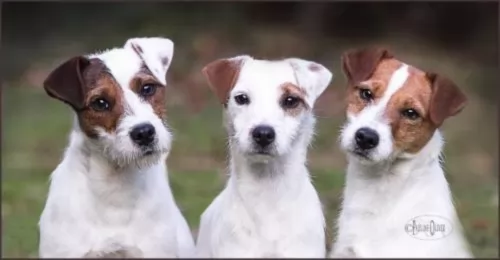 The Parson Russell Terrier has different coat types – the smooth and rough and both will require regular brushing. Rough coats will require plucking or clipping to avoid matting.
The Parson Russell Terrier has different coat types – the smooth and rough and both will require regular brushing. Rough coats will require plucking or clipping to avoid matting.
Check his eyes and ears regularly. Look inside his ears for excess wax and dirt which could lead to an ear infection. His nails should also be trimmed.
No Puppies – Spay or Neuter:
The best thing you can do for your Parson Russell Terrier if you don’t want your pet producing puppies is to have it spayed or neutered. Spaying for females or neutering for males decreases the likelihood of certain types of cancers too so it can be beneficial.
Diet:
Diet is hugely important for a Parson Russell Terrier and the food you decide for him can impact his health. Many time those ‘treats’ you feed your pet do nothing more but give him a stomach ache.
It's tempting to pop chocolates, popcorn, nuts and ice cream into your pets mouth when he is so adorable but in the long run it is shortening his life. All he basically requires and needs is a simple, consistent diet of the top commercially manufactured foods mixed with some tasty home made food from time to time.
Boiled chicken, brown rice and vegetables such as sweet potatoes, carrots and spinach will do your pet wonders. Ensure he always has fresh, cool water available to him.
1.Feeding the puppy Feed a high quality toy puppy food 3-4 meals per day a total of ¼ cup for the day.
2.Feeding the adult Feed a high quality toy puppy food 1-2 meals per day a total of ½ cup for the day.
3.Points for Good Health – No inherited issues.
4. Games and Exercises – These are high energy dogs as both parent breeds are such. They need to run, love having a fenced yard, 15-20 minute walks per day.
Comparison with other breeds
- Parson Russell Terrier vs English Bulldog - Breed Comparison
- Parson Russell Terrier vs German Shepherd - Breed Comparison
- Parson Russell Terrier vs Golden Retriever - Breed Comparison
- Parson Russell Terrier vs Labrador Retriever - Breed Comparison
- Parson Russell Terrier vs West Highland White Terrier - Breed Comparison
- Parson Russell Terrier vs French Bulldog - Breed Comparison
- Parson Russell Terrier vs Beagle - Breed Comparison
- Parson Russell Terrier vs Yorkshire Terrier - Breed Comparison
- Parson Russell Terrier vs Poodle - Breed Comparison
- Parson Russell Terrier vs Rottweiler - Breed Comparison
- Parson Russell Terrier vs Boxer - Breed Comparison
- Parson Russell Terrier vs English Pointer - Breed Comparison
- Parson Russell Terrier vs Siberian Husky - Breed Comparison
- Parson Russell Terrier vs Doberman Pinscher - Breed Comparison
- Parson Russell Terrier vs American Bully - Breed Comparison
- Parson Russell Terrier vs Abruzzenhund - Breed Comparison
- Parson Russell Terrier vs Affenpinscher - Breed Comparison
- Parson Russell Terrier vs Afghan Hound - Breed Comparison
- Parson Russell Terrier vs Aidi - Breed Comparison
- Parson Russell Terrier vs Airedale Terrier - Breed Comparison
- Parson Russell Terrier vs Akbash Dog - Breed Comparison
- Parson Russell Terrier vs Akita - Breed Comparison
- Parson Russell Terrier vs Africanis - Breed Comparison
- Parson Russell Terrier vs Askal - Breed Comparison
- Parson Russell Terrier vs Atlas Terrier - Breed Comparison
- Yorkillon vs English Bulldog - Breed Comparison
- Yorkillon vs German Shepherd - Breed Comparison
- Yorkillon vs Golden Retriever - Breed Comparison
- Yorkillon vs Labrador Retriever - Breed Comparison
- Yorkillon vs West Highland White Terrier - Breed Comparison
- Yorkillon vs French Bulldog - Breed Comparison
- Yorkillon vs Beagle - Breed Comparison
- Yorkillon vs Yorkshire Terrier - Breed Comparison
- Yorkillon vs Poodle - Breed Comparison
- Yorkillon vs Rottweiler - Breed Comparison
- Yorkillon vs Boxer - Breed Comparison
- Yorkillon vs English Pointer - Breed Comparison
- Yorkillon vs Siberian Husky - Breed Comparison
- Yorkillon vs Doberman Pinscher - Breed Comparison
- Yorkillon vs American Bully - Breed Comparison
- Yorkillon vs Abruzzenhund - Breed Comparison
- Yorkillon vs Affenpinscher - Breed Comparison
- Yorkillon vs Afghan Hound - Breed Comparison
- Yorkillon vs Aidi - Breed Comparison
- Yorkillon vs Airedale Terrier - Breed Comparison
- Yorkillon vs Akbash Dog - Breed Comparison
- Yorkillon vs Akita - Breed Comparison
- Yorkillon vs Africanis - Breed Comparison
- Yorkillon vs Askal - Breed Comparison
- Yorkillon vs Atlas Terrier - Breed Comparison
 Petzlover
Petzlover Parson Russell Terrier is originated from United Kingdom but Yorkillon is originated from United States. Parson Russell Terrier may grow 13 cm / 6 inches higher than Yorkillon. Both Parson Russell Terrier and Yorkillon are having almost same weight. Both Parson Russell Terrier and Yorkillon has almost same life span. Both Parson Russell Terrier and Yorkillon has almost same litter size. Both Parson Russell Terrier and Yorkillon requires Moderate Maintenance.
Parson Russell Terrier is originated from United Kingdom but Yorkillon is originated from United States. Parson Russell Terrier may grow 13 cm / 6 inches higher than Yorkillon. Both Parson Russell Terrier and Yorkillon are having almost same weight. Both Parson Russell Terrier and Yorkillon has almost same life span. Both Parson Russell Terrier and Yorkillon has almost same litter size. Both Parson Russell Terrier and Yorkillon requires Moderate Maintenance.  The Parson Russell Terrier hails from England and is a small to medium sized dog dating back to the 18th century. It is believed that Reverend John ‘Jack’ Russell was the developer of this dog. The Parson has always been involved with England’s sport of foxhunting.
The Parson Russell Terrier hails from England and is a small to medium sized dog dating back to the 18th century. It is believed that Reverend John ‘Jack’ Russell was the developer of this dog. The Parson has always been involved with England’s sport of foxhunting. The Parson Jack Russell is essentially a white dog with black and tan or orange-fawn patches. He can be tri-colored too. The coat is either smooth, rough or broken.
The Parson Jack Russell is essentially a white dog with black and tan or orange-fawn patches. He can be tri-colored too. The coat is either smooth, rough or broken. In general the Parson is a friendly,loving dog, fairly small but packed full of feisty personality.
In general the Parson is a friendly,loving dog, fairly small but packed full of feisty personality. Your Parson Jack Russell can live to be between 12 and 15 years but nonetheless he does have some breed-related health issues to watch for.
Your Parson Jack Russell can live to be between 12 and 15 years but nonetheless he does have some breed-related health issues to watch for. The Parson Russell Terrier has different coat types – the smooth and rough and both will require regular brushing. Rough coats will require plucking or clipping to avoid matting.
The Parson Russell Terrier has different coat types – the smooth and rough and both will require regular brushing. Rough coats will require plucking or clipping to avoid matting.